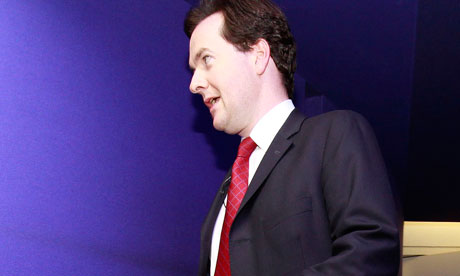Chancellor says Treasury works very well with DWP and that he and Iain Duncan Smith have a good relationship

George Osborne was today forced to defend himself from claims by a coalition colleague that he was indulging in an "immature turf war" with the Department for Work and Pensions over plans to cut at least extra £4bn from the welfare benefit bill.
The £4bn annual cut emerged from Treasury briefings last week, but was not accepted by senior figures at the DWP. The £4bn figure focuses on out of work-related benefits and is separate from plans to limit the age threshold for access to child benefit, or the winter fuel allowance.
Ministers have been looking at reducing the age at which child benefit is available to 16, as well as to raise the age threshold for the winter fuel allowance from 60 to 70. Such reforms could save billions.
In the Commons, Bob Russell, the Liberal Democrat backbencher, attacked Osborne for indicating he planned to make an extra £4bn in cuts during a BBC interview last week. Russell said: "While I have no time for the welfare cheats, to try and blame this country's financial ills on this small category of the population is unethical".
He added: "It would be ethical to show an equal determination to tackle the cheats who avoid and evade tax.
"I find it somewhat immature this turf war between your office and the secretary of state for work and pensions".
The Speaker, John Bercow, had granted a request from Russell that Osborne be forced to make a Commons statement on his welfare cuts plans. Osborne denied he was involved in any dispute with the work and pensions secretary, Iain Duncan Smith, describing some of his welfare reform plans as inspirational.
But Osborne insisted he had always suggested he would be looking for extra cuts in the welfare budget, and added "staggering figures" are expected to be published later this week by the Office of National Statistics on the scale of "the tax gap" that Gordon Brown allowed to develop. The tax gap is the difference between what is forecast to be collected and what is collected.
Osborne promised "the government will be taking steps to reduce tax avoidance including tax avoidance by some of the richest people in society". He said the overall aim is to cut £61bn from the departmental budgets – £17bn more than planned by Labour in its pre-election deficit reduction programme.
But Osborne implied that the treasury wanted to retain some of the extra DWP savings to reduce the overall deficit, and not allow the savings to be ploughed back entirely into potentially expensive DWP plans to reform the benefits system to increase work incentives.
Duncan Smith believes better work incentives will in the medium term reduce the overall size of the welfare bill. He also believes changes in the way that the government can calculate an individual's income in real time through better computer software will make it easier to introduce welfare reform, and reduce fraud and error.
The government in the emergency budget in June announced plans to save £11bn from welfare, and at the time Osborne indicated he was looking for further savings from the welfare budget if at all possible.
The chancellor said yesterday: "The failure of welfare reform of the past decade had been one of the worst failures of the last government."
The shadow work and pensions secretary, Yvette Cooper, highlighted leaked letters suggesting reforms to the employment support allowance, the chief benefit for the sick, have been agreed within government delivering an extra net savings of £2.5bn by 2014-5. She claimed these savings can only be achieved by creating an additional 800,000 jobs, or by targeting those that are genuinely too sick to work.
Source
No comments:
Post a Comment